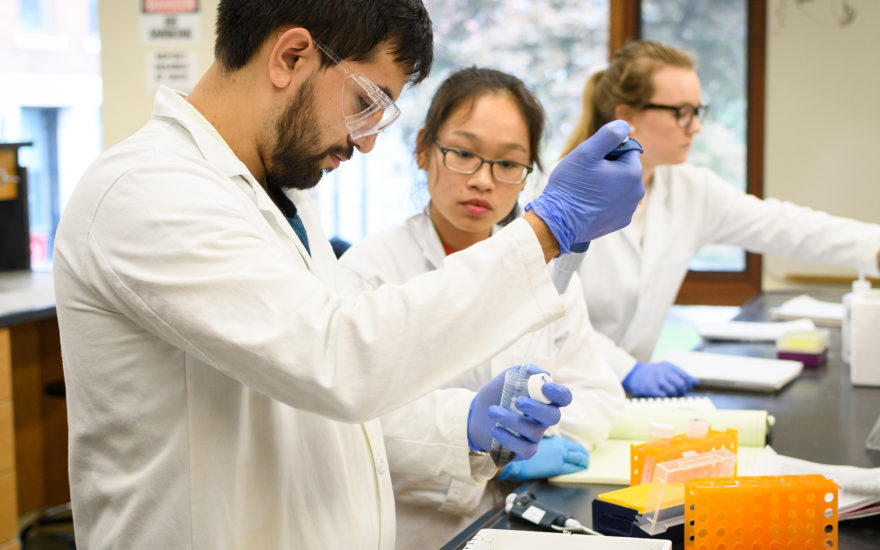BCMB 131
Recombinant DNA
This lab-oriented course will have you making (recombining) new DNA from two or more existing DNA strands, often from different organisms. You’ll deploy a range of techniques as part of a semester-long project.

Request Information
Make sense out of life.
One of the most exciting and influential areas of science today, biochemistry and molecular biology (BCMB) exists at the intersection of biology and chemistry. Exploring the cellular and molecular building blocks of living organisms is a fascinating — and humbling — experience, as you uncover the very conditions and interactions that make life (and you) possible.
Leading to a bachelor of arts degree, the biochemistry and molecular biology major puts you on the fast track to discovery, allowing you to engage in research as early as your first year, co-author research papers with faculty members or graduate students, and present those papers at professional conferences. Whether you choose to enter the industry or pursue an advanced degree, you’ll graduate ready to hit the ground running.
Biochemistry and Molecular Biology
BCMB 131
This lab-oriented course will have you making (recombining) new DNA from two or more existing DNA strands, often from different organisms. You’ll deploy a range of techniques as part of a semester-long project.
BCMB 237
Explore how currently available drugs interact with biological systems at the molecular level to combat a range of infections and diseases, and read journal articles to see examples of drug development research.
BCMB 279
Gain experience using software packages to analyze chemical and biochemical systems retrieval, such as analysis of DNA and protein sequence information, and simulations of protein dynamics and ligand binding.
BIOL 143
Our nervous system enables us to learn, remember, think, and experience emotion. Explore how these critical systems develop and function—especially in mammals—and their relationship to behavior and disease.
The biochemistry and molecular biology major is highly structured and requires a solid grounding in biology and chemistry, as well as courses in physics and calculus. You also will take biochemistry, a yearlong course sequence that reviews our current understanding of the field, before moving on to more advanced courses, one of which must fulfill a techniques requirement.
Our robust Prehealth Advising Program is available if you’re interested in pursuing a career in the health profession.
Skills you will learn include:
Learn about our biology and chemistry facilities and equipment available for teaching and research, and the resources at Clark’s Carlson Science Library.
During your junior year, you might be accepted into the biochemistry and molecular biology honors program. Joining the program means you’ll work closely with a professor to create a thesis on a topic of your choice. Examples of recent honors thesis topics are:
Building your foundation
The Clark Core allows students to take courses across diverse disciplines, helping them develop critical thinking skills and respect for other cultures and perspectives. You’ll connect classroom learning with action through world and workplace experiences.